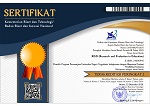An etnographic study of elementary education in the rural area of Dompu county, the province of West Nusa Tenggara
Zamroni Zamroni, Yogyakarta State University, Indonesia
Sumarno Sumarno, Yogyakarta State University, Indonesia
Abstract
Keywords
Full Text:
PDFReferences
Central Bureau of Statistics of Nusa Tenggara Barat Province. (2011). Nusa Tenggara Barat dalam angka [Nusa Tenggara Barat (NTB) in figures]. Mataram: Central Bureau of Statistics of Nusa Tenggara Barat Province in cooperation with Regional Development Planning Board of NTB Province.
International Labour Office. (2003). Working out of poverty. Geneva: International Labour Office.
Koentjaraningrat. (1987). Kebudayaan dan mentalitas pembangunan [Culture and development mentality]. Jakarta: PT. Gramedia.
Kutanegara, M., Mustar, E., & Purwatiningsih, S. (2007). Mendorong program kemiskinan dan raskin berbasis lokal [Encouraging local-based poverty and rice for poor society programs]. Populasi, 18, 167-185.
Narayan, D., Chambers, R., Shah, M.K., & Petesch, P. (2000). Poverty is powerlessness and voicelessness. Finance & Development, 37(4), p.18.
Slamet. (2008). Desentralisasi pendidikan di Indonesia [Educational decentralization in Indonesia]. Jakarta: Departemen Pendidikan Nasional.
Smeru Research Institute. (2005). Developing a poverty map in Indonesia: A tool for better targeting in poverty reduction and social protection programs. Retrieved from www.smeru.or.id/.../povertymapping4/
Sudarminta, J. (2000). Tantangan dan permasalahan pendidikan di Indonesia memasuki milenium ketiga [Educational challenge and problems in Indonesia entering the third millennium]. In A. Atmadi & Y. Setiyaningsih. (Eds.), Transformasi pendidikan memasuki milenium ketiga [Educational transformation entering the third millennium] (pp.3-15). Yogyakarta: Kanisius.
Suharko. (2007). The roles of NGOs in rural poverty reduction: The case of Indonesia and India. Nagoya: Nagoya University.
Surakhmat, W. (2009). Pendidikan nasional: Strategi dan tragedi [National education: Strategy and tragedy]. Jakarta: PT Kompas Media Nusantara.
Thut, I.N. & Adams, D. (2005). Pola-pola pendidikan dalam masyarakat kontemporer [Educational patterns in contemporary society]. (SPA Teamwork, Trans.). New York, NY: McGraw-Hill Book.
Thuy, T.N. (2012). Poverty reduction strategies in an ethnic minority community: Multiple definitions of poverty among Khmer villagers in the Mekong delta, Vietnam. Asian Social Science, 6, 196-208. doi:http://dx.doi.org/10.5539/ass.v8n6p196
Tukiran. (1993). Penentuan desa miskin [Determining poor villages]. Populasi, 14(1), 13-23.
World Bank. (2012). Protecting poor and vulnerable household in Indonesia. Jakarta: World Bank Jakarta Office.
Zamroni. (2010). Pendidikan dan kemiskinan. In Tukiran, A.J. Pitoyo, & P.M. Kutanegara (Eds.). Akses penduduk miskin terhadap kebutuhan dasar [Access of poor inhabitants towards primary needs] (pp.185-221). Yogyakarta: Pusat Studi Kependudukan dan Kebijakan, Universitas Gadjah Mada.
DOI: https://doi.org/10.21831/reid.v2i1.8270
Refbacks
- There are currently no refbacks.

This work is licensed under a Creative Commons Attribution-ShareAlike 4.0 International License.







.png)







